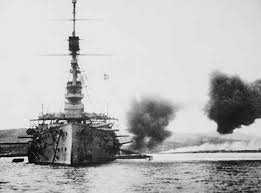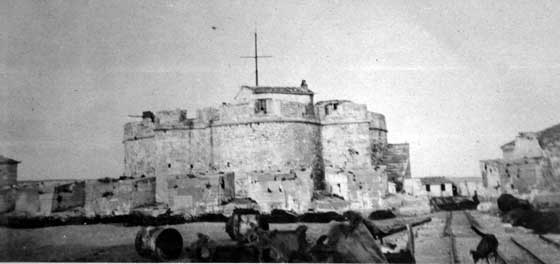Turkish Forts in Ruins.
Attack on Strategic Straits To ‘Knock Turkey Out of War.’
Special to The Great War Project.
(19-21 February) British warships are bombarding the ancient forts in the Dardanelles in western Turkey. The British bombardment is successful. It reduces two forts there to rubble.
The Dardanelles is a very narrow strait that connects the eastern Mediterranean to the Sea of Marmara, the waterway to Constantinople, the Ottoman capital. In ancient times it was known as the Hellespont.
British targeting of the Dardanelles is strategic. Its purpose, according to war historian John Keegan: “To open a supply route to Russia through the Dardanelles and, in so doing, to knock Turkey out of the war” by bombarding Constantinople.
Conceived primarily by Winston Churchill, the First Lord of the Admiralty, the campaign is to be solely a naval operation. Its goal is also to relieve the Turkish pressure on Russia in the east of Turkey — in the Caucasus. There in the snows of winter, Russia needs help, and St. Petersburg asks the British to do something that will draw Turkish troops away from the eastern battle with Russia.
War is not unknown to the Dardanelles.
“The strategic location of the Dardanelles had brought armies, and navies to it scores of times in history,” writes Keegan. The first such clash occurred in 378 AD. One of the casualties then, the Emperor Valens, which brought about the collapse of the Roman Empire in the west.
In more recent times, it is the ambition of Russia, Keegan reports, to seize Constantinople, “thus recovering the seat of Orthodox Christianity from Islam,” and providing Russia with a warm water route to the seas.
The possibility of a naval attack on the Dardanelles increasingly seizes the attention of the British, the greatest maritime power in the world. Britain does not have the soldiers for a land invasion in any case, but it does possess the ships necessary to mount a naval operation.
Winston Churchill, the first Lord of the Admiralty, becomes convinced the job can be by naval power alone.
The British bombardment of forts at the southern end of the straits begins on February 19th a century ago “with sensational political, if not military effect.” One of the most important developments is to entice other nations to join the battle. ”Greece offered troops to participate in the campaign,” reports Keegan. “The Bulgarians broke off negotiations with Germany,” and the Russians let it be known that they intend to attack Constantinople.
The bombardment continues for a another day, leaving two Turkish forts in ruins. But the Turks, and the British as well, writes historian Martin Gilbert, learn that the ruins make for great hiding places for artillery and machine gunners.
There is much more war to come in the Dardanelles.


